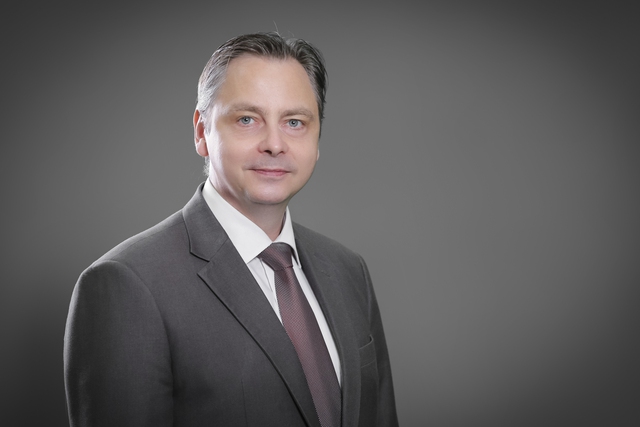AHK speaks highly of proactive measures to support businesses, stimulate economic growth
VGP - Vietnamese Government’s recent directions to reduce business costs and boost production and manufacturing are just some of the many proactive measures being undertaken to support businesses and stimulate economic growth.

Mr. Marko Walde, Chief Representative of German Industry and Commerce in Viet Nam (AHK Viet Nam) and Vice Chairman of German Business Association in Viet Nam (GBA Viet Nam)
Mr. Marko Walde, Chief Representative of German Industry and Commerce in Viet Nam (AHK Viet Nam) and Vice Chairman of German Business Association in Viet Nam (GBA Viet Nam) made that above statement in his interview with the VGP.
According to Marko Walde, during the pandemic, Viet Nam's economy has proven to be a stable and attractive destination for investors, thanks to the government's efforts to balance economic growth and public health.
The results have been remarkable, showing that Viet Nam's economy is a "safe haven" for investors, even amidst global crises such as the trade conflict between the U.S. and China, COVID-19 outbreaks, supply chain bottleneck, the Ukraine conflict, and the zero-COVID strategy in China.
In 2022, Viet Nam's GDP increased by 8.02 percent, despite low demand worldwide and a high inflation rate. The Vietnamese Government has managed to ease inflationary pressure by adjusting fiscal policies. This has given German companies confidence in their business development.
According to the AHK World Business Outlook Survey Fall 2022, 86 percent of German companies are confident with their business situation in Viet Nam, while 83 percent plan to invest further in their local factories in the nation in 2023.
Gov't implements flexible, effective fiscal, monetary policies
As a Chief Representative of AHK Viet Nam and as a Vice Chairman of GBA Viet Nam, Marko Walde expressed his warmest thanks to the Prime Minister and the Government's efforts in creating such open direct dialogues.
With the long-term perspective of German businesses, he voiced his belief that the Vietnamese Government's efforts to support businesses, including foreign-invested ones, are ongoing and evolving.
The government has implemented a range of flexible and effective fiscal and monetary policies to boost liquidity, support small and medium-sized enterprises (SMEs), and stimulate economic growth. These policies have included tax breaks, loan guarantees, and interest rate reductions.
In addition, the Vietnamese government has also been working to improve the business environment and attract foreign investment.
In recent years, Viet Nam has implemented reforms to simplify administrative procedures, reduce red tape, and enhance transparency and accountability. These efforts have helped to improve Viet Nam's rankings in global competitiveness and ease of doing business.
Since Germany and Viet Nam elevated their bilateral relations to a strategic partnership in 2011, the cooperation between the two countries have developed strongly and extensively in various fields, including economic development.
As a result, about 500 German companies have invested nearly US$2.9 billion in Viet Nam, creating approximately 50,000 job opportunities. These investments have contributed positively to bilateral economic relations.
The majority of these German investments are SMEs that have selected Viet Nam as an investment destination.
Over three-quarters of the projects and two-thirds of Germany's investment capital in Viet Nam concentrate on processing, manufacturing, business process outsourcing (BPO) and information technology (IT), technical services, banking, and insurance industries.
Prioritizing human capital development-key to success
The Chief Representative of AHK Viet Nam said that the current state of the global economy is characterized by multiple crises and upheavals, posing significant challenges for businesses.
This has resulted in increased competition among countries to retain and attract investments, forcing companies to reassess the investment landscape, he said, adding that the AHK Viet Nam remains confident in Viet Nam's potential to succeed.
To seize the opportunity to attract more foreign investment, Marko Walde underlined the significance of prioritizing human capital development.
"As German businesses, we firmly believe that people are key to success, and this belief has only become more significant over time. We recognize that investing in human capital is a critical factor in determining a country's economic potential", he said.
Therefore, the AHK Viet Nam stands ready to collaborate with Viet Nam to equip the workforce with the skills needed, according to the German standards, to capitalize on the opportunities presented by Industry 4.0 and digital transformation, reiterated Marko Walde.
Besides, Viet Nam should speed up the completion and implementation of Power Development Plan (PDP) VIII in order to incentivize renewable power production, he suggested.
To remain a significant link in the global and German supply chain, Viet Nam needs to strengthen local suppliers and support them in developing their competitive advantages.
Furthermore, the nation should comply with the new regulations and standards for sustainable development, such as the environmental, social and governance (ESG) or Supply Chain Due Diligent Act 4; address the work permit bottleneck to attract and retain talent; and increase tourism by extending visa-free entry to German and other European Union member states.
He recommended Viet Nam improve access to pharmaceuticals and medical devices by optimizing management processes and implementing global best practices; and drive trade growth under the EU-Viet Nam Free Trade Agreement (EVFTA) by harmonizing administrative procedures and tax policies.
In addition, Marko Walde underlined the need to prioritize comprehensive digital transformation in the public and private sectors to maintain Vietnamese economic competitiveness and future-proof administrative capacity./.

